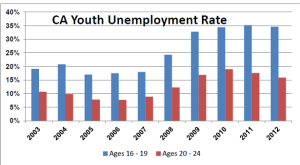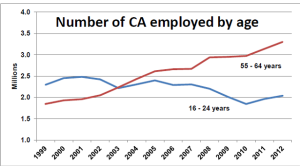Governor Brown has indicated he will sign a two-dollar increase in the minimum wage, which he brokered in the Legislature. This is unfortunate news for young and unskilled workers, who will be hardest hit by the mandated 25% hike over the next two years. (In 2012, the California minimum wage was $8.00/hour, compared with the federal minimum wage of $7.25/hour.)
According to the US Department of Labor, minimum wage workers tend to be young. Although workers under age 25 represented only about one-fifth of hourly paid workers, they made up about half of those paid the federal minimum wage or less. Among employed teenagers paid by the hour, about 21 percent earned the minimum wage or less, compared with about 3 percent of workers age 25 and over.
Our youngest residents are also those who are finding it most difficult to find work, even as the economy is in recovery. Young adults face an unemployment rate north of 15 percent, while teenage unemployment is nearly 35 percent.
According to UC Irvine economist David Neumark, we can expect an increase in the minimum wage to be followed by a decrease in youth employment, as much as a 3.75% drop in employment as a result of this legislation. This mandated wage hike will make a terrible situation even worse.
Noted economist Robert Samuelson has written:
Companies that think themselves condemned to losses or meager profits won’t expand. Not surprisingly, a study by two economists at Texas A&M finds that the minimum wage’s biggest adverse effects are on future job growth, not current employment. To this defect must be added another: An excessively high minimum will attract more skilled workers, denying the less skilled an entry point to work and on-the-job training.
Last year, California public high schools graduated fewer than 79% of the 12th grade cohort that began in the 9th grade. The graduation rate for Hispanic and African American students was even worse: 73.5% and 65.9%, respectively.
These non-graduates are also the least skilled individuals entering the workforce. And they are about to be priced out of the job market – out-competed by higher-skilled entrants – denying them the opportunity to gain skills that can be leveraged for better-paid jobs. This is a formula for economic stagnation.
This isn’t just a problem for future members of the underclass. Our economy depends on younger workers to replenish out workforce.
The minimum wage increase will extend our economic doldrums and reduce opportunities for the young and unskilled. There are better ways to address poverty than by reducing the aggregate job creation in California.



